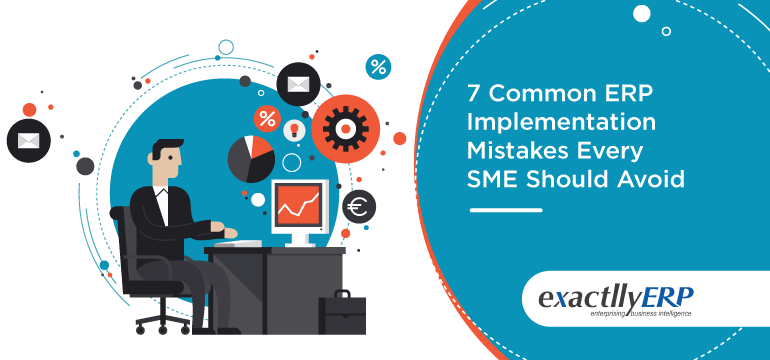7 Common ERP Implementation Mistakes Every SME Should Avoid

Enterprise Resource Planning (ERP) is one of the most important tools an organization could employ. In essence, ERP systems are about collecting all the information about the customers and the processes that occur in an enterprise. It is an exhaustive system that includes all the data your organization generates and would eventually use it for making informed decisions.
For this reason, the correct implementation of ERP systems is a must. Especially for small and medium enterprises (SME), it is all the more vital, since any changes made later on would require a lot of money, time and manpower.
For efficient implementation, it is good to know about the common ERP implementation mistakes people usually make while deploying ERP systems in their organization, so you can avoid falling into the same trap:
1. Poor Planning:
There is a reason why all the best things come with good plans. Implementing ERP is a long and exhaustive process that would include numerous steps and procedures. Even a single missing step or component can render the whole exercise useless, leading to a huge waste loss of money, resources and time.
Lack of planning also stops you from knowing the exact amount of money, time and manpower that would be required in the project. Such ERP implementation mistakes can catch up later to haunt you.
You must ensure that a proper plan is formulated that consist of every step that would be taken while implementing the ERP system. The plan should also account for any roadblocks that might occur on the way, and give enough margins for errors.
In short, the plan you make must be efficient and detailed, so that the eventual implantation is successful.

2. Know the System:
ERP systems are recognized today as one of the vital components of business procedures. However, despite this, not many people are completely aware of what ERP can do.
One of the common misconceptions is that ERP is required only by big companies. The truth is, even SMEs can use it for effective decision-making. However, you need to carry out a detailed analysis of your existing systems and check how ERP would affect them, integrate with them and work with them.
Another of the common ERP implementation mistakes is that people are unable to identify a good ERP system. It is necessary that you are aware of the prerequisites of a good ERP system and find a good vendor if you hope to get the most out of it.
Remember to steer clear of ERP vendors who promise a lot of features at low rates. Any discount you get would be minuscule in comparison to the loss you would endure if the ERP system is not efficient or sound.
3. Friction within the Team:
Strangely enough, one of the biggest problems that occur while implementing ERP systems occurs from inside the company. Many employees are not aware of the nature and need of the ERP system, so it is a completely alien technology for them; a change that they are bound to resist, given human nature.
Moreover, since they would also be required to work on this alien technology that they possibly even consider a threat to their own job, most people don’t take kindly to it.
Another issue is with the stakeholders, whose trust is necessary for implementing the ERP system in your company. Failure to have the stakeholders on board can lead to many troubles.

4. Underestimating ERP:
It is perhaps a part of our corporate culture to simply finish the job by any means necessary. Be it patchwork or adjustments, we are largely concerned only with the end result and not about the process we undertake to achieve it.
While this approach works most of the time, it would be foolish to treat implementing an ERP system as yet another IT project. ERP systems are comprehensive and huge, and they require a lot of time, money and manpower.
As such, it must be communicated clearly to the employees that it isn’t a regular project, and therefore, regular gimmicks won’t work over it. Only adherence to rules and strict guidelines would help.
5. Choose the Team Wisely:
Most of the time, companies tend to include those people in the team who are easily available. This is a grave mistake that could jeopardize the entire operation of ERP implementation.
ERP implementation is an exhaustive process with countless steps and sub-modules. Each of them requires a particular skill set, and hence, people with those particular skill sets. It is important that the right people in the team are made responsible for implementing ERP.
Apart from reducing the chances of errors, it would also increase the overall efficiency of the entire implementation.

6. Understand need and Scope:
Before you opt for an ERP, you need to think carefully about ‘why’ you are looking for one. An ERP system is a huge tool, and one must opt for it only if they are absolutely sure of its necessity.
Realizing after the implementation that you never really needed it would only result in loss of time and money.
Another thing to be kept in mind is the scope of the implementation. ERP systems are effective and exhaustive, but they are not divine. They cannot solve all your problems, so it is necessary that the exact scope of the system must be understood.
The expectations set must be realistic and goals achievable. Failing to do so is one of those ERP implementation mistakes that would only give you sub-optimal results and cause disappointment.
7. Setting Resources and Finances:
Like we have mentioned several times, implementing ERP is an exhaustive process. A huge amount of money, time and manpower are involved in it. This can often lead to grave problems like a lack of resources and funds.
For instance, realizing that you do not have enough qualified IT employees once the implementation process has begun can bring the entire process to a halt, causing you severe delay.
Similarly, a lack of finances can also halt the implementation. It must be ensured that you have enough time, money and resources before you start implementing the ERP systems.
Conclusion:
Implementing ERP systems is one of the most complex projects you could undertake for your company. Problems and roadblocks will be a part of it, like any other project. However, knowing about the common problems faced by most will give you a fighting chance to prepare against those pitfalls and avoid them.







